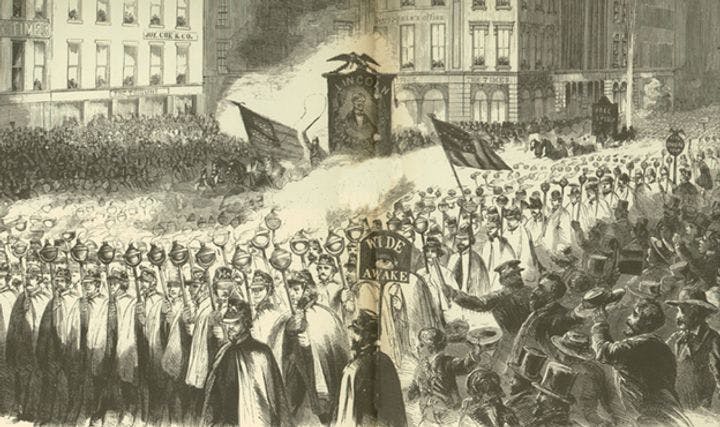Winter 2010
Lincoln's Rabble-Rousers
– The Wilson Quarterly
Who were the 'Wide Awakes' during the American Civil War?
Any student of American history knows that soon after Abraham Lincoln was elected president, hostilities broke out and the nation plunged into civil war. Jon Grinspan, a doctoral candidate at the University of Virginia, writes that historians have not paid enough attention to the role played by a movement called the Wide Awakes in setting the scene for these events.
The Wide Awakes emerged out of a hard-fought political contest for the governorship of Connecticut, considered “a presidential election in miniature.” In March 1860, several young textile clerks and rifle makers organized a group to escort Republican speakers through the dangerous streets of Democratic Hartford. They wore black capes covered with shiny enamel to protect their clothes from oil dripping from the torches they carried. Soon the organization’s headquarters teemed with young Republican men. When the Republican gubernatorial candidate squeaked out a victory by a few hundred votes, many chalked up the win to the fervor whipped up by the Wide Awakes.
Within months, Wide Awake groups sprang up across the country. They let go of their original purpose as escorts and focused primarily on nonviolent parades in support of Republican candidates. Leaders drew up circulars detailing the Wide Awakes’ history, constitution, and structure, and sent samples of their uniform to the local units. Tailors experienced shortages of the enameled cloth used to make the signature capes.
For the most part, Wide Awake clubs filled their ranks with white men in their teens, twenties, and thirties. They were partisans, not abolitionists. At the time, their numbers were purported to be as high as half a million nationwide, but Grinspan thinks the figure is probably closer to 100,000. Still, he says, that’s nothing to scoff at—as a percentage of the U.S. population, that would be equal to about one million people today. Northerners became so accustomed to the roving bands of Wide Awakes that when a small earthquake struck Boston in mid-October, some thought the sounds came from the Wide Awakes running drills on Boston Common.
Although the Wide Awakes were nonviolent, militarism permeated the group’s style and ethos. They marched in lockstep, practiced infantry drills (taught to them by former and future military icons including Ulysses S. Grant), and wore uniforms. Onlookers in the South perceived a threat. Many historians point to the establishment of the Minute Men in South Carolina in 1860 as a major stepping stone on the path to civil war, but few recall that they emerged “as an offset to the Wide Awakes of the North.” When the Wide Awake chapters did not disband after the election, Southerners feared a permanent national movement.
Grinspan writes, “While certainly not a cause of the war, the Wide Awakes’ presence ratcheted up sectional pressure and invested Lincoln’s election with weighty significance.” Wide Awakes later said the group had presaged the Civil War, but Grinspan says that “at the time they barely saw it coming.”
* * *
The Source: "Young Men for War: The Wides Awakes and Lincoln's 1860 Presidential Campaign" by Jon Grinspan, in The Journal of American History, September 2009.
Image courtesy of Wikimedia Commons
